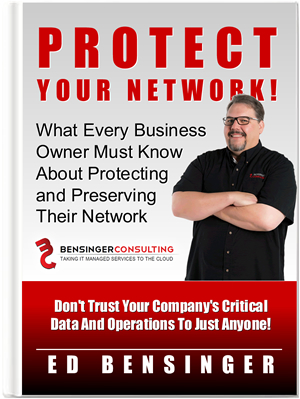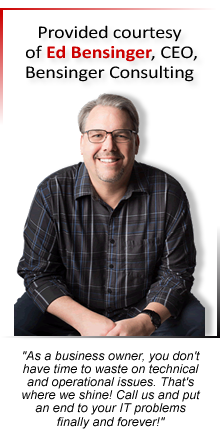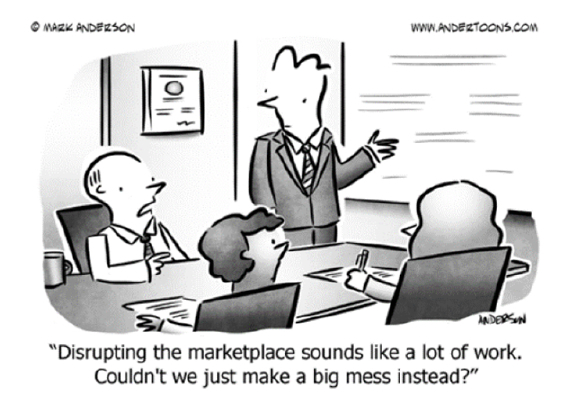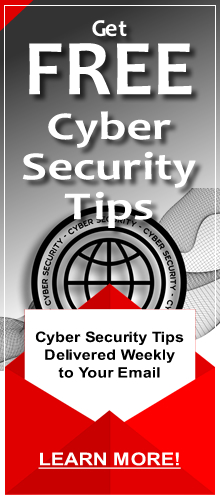
HOW TO SAFELY SHARE PASSWORDS
WITH EMPLOYEES
If you ask a security professional, you get by-the-book advice about sharing passwords: “Don’t share passwords.” But we know, in reality, that doesn’t work. Your office might be sharing a single password for apps like Survey Monkey right now to save cash on buying additional users, and some social media accounts don’t even give you the option to have multiple log-ins.
Sharing passwords in your office is sometimes necessary for collaboration, and the best way to do this is by using a password manager. Affordable (some platforms even offer free versions), layered with security and simple to use, password managers are the safest and easiest way to store and share your company’s private passwords.
Reasons You Would Need To Share Your Passwords
Shared accounts are the biggest reason businesses share passwords, whether their employees work from a physical office or at home.
Sharing passwords in your office is sometimes necessary for collaboration, and the best way to do this is by using a password manager. Affordable (some platforms even offer free versions), layered with security and simple to use, password managers are the safest and easiest way to store and share your company’s private passwords.
Reasons You Would Need To Share Your Passwords
Shared accounts are the biggest reason businesses share passwords, whether their employees work from a physical office or at home.
It improves collaboration and makes employees jobs a lot easier.
Medical leaves, turnover, vacations and “Bob isn’t coming in because he ate bad fish last night but has our Amazon log-in” are other reasons passwords get handed around like a plate of turkey at Thanksgiving dinner.
However, unsafe sharing habits will put your private passwords in the hands of greedy hackers, who can fetch a high price for your data in dark web markets. IBM Security reported that in 2022, 19% of all breaches were caused by stolen or compromised credentials.
So, how do you share passwords safely?
First, Avoid These Common Password-Sharing Mistakes. When it comes to password sharing, remember:
1.Don’t send passwords via e-mail: E-mail is the #1 target of hackers, and many e-mail services aren’t encrypted.
Medical leaves, turnover, vacations and “Bob isn’t coming in because he ate bad fish last night but has our Amazon log-in” are other reasons passwords get handed around like a plate of turkey at Thanksgiving dinner.
However, unsafe sharing habits will put your private passwords in the hands of greedy hackers, who can fetch a high price for your data in dark web markets. IBM Security reported that in 2022, 19% of all breaches were caused by stolen or compromised credentials.
So, how do you share passwords safely?
First, Avoid These Common Password-Sharing Mistakes. When it comes to password sharing, remember:
1.Don’t send passwords via e-mail: E-mail is the #1 target of hackers, and many e-mail services aren’t encrypted.
Continued on page 2
Continued from page 1
Those that are encrypted are still risky because e-mails are stored in several servers on their way to or from your account. That means your e-mail is sitting in a Sent folder, ripe for the taking by anyone who gets into your e-mail account, encrypted or not.
2. Never text or chat passwords: Like e-mails, SMS messages or messaging apps like Slack aren’t secure. Once a text is sent, it is available for anyone to see.
3. Stay away from storing passwords using pen and paper and shared documents: Sticky notes, memo pads, Google Docs –
4. NEVER write down your passwords: Avoid the temptation to store passwords on your device: If your device gets hacked, nothing stops that perp from taking every password you saved.
The Best Way To SAFELY Share And Store Your Passwords
We recommend using reliable password managers because they have multiple layers of encryption so only those with a key (your master password) can see it, AND they include more robust security and sharing features like:
- Zero-knowledge architecture: Not even your password manager service can see the information you save in your vault. Multi-factor authentication (MFA): For added log-in security.
- Unique password generation: Creates strong, random passwords to improve log-in security.
Those that are encrypted are still risky because e-mails are stored in several servers on their way to or from your account. That means your e-mail is sitting in a Sent folder, ripe for the taking by anyone who gets into your e-mail account, encrypted or not.
2. Never text or chat passwords: Like e-mails, SMS messages or messaging apps like Slack aren’t secure. Once a text is sent, it is available for anyone to see.
3. Stay away from storing passwords using pen and paper and shared documents: Sticky notes, memo pads, Google Docs –
4. NEVER write down your passwords: Avoid the temptation to store passwords on your device: If your device gets hacked, nothing stops that perp from taking every password you saved.
The Best Way To SAFELY Share And Store Your Passwords
We recommend using reliable password managers because they have multiple layers of encryption so only those with a key (your master password) can see it, AND they include more robust security and sharing features like:
- Zero-knowledge architecture: Not even your password manager service can see the information you save in your vault. Multi-factor authentication (MFA): For added log-in security.
- Unique password generation: Creates strong, random passwords to improve log-in security.
- Fake log-in page warnings: Warns you if a page is spoofed by hackers.
- Breach or weak password notification: Alerts you if one of your passwords was leaked or if your current password is weak
- Simple, secure built-in password sharing: Some password managers let you choose which passwords your employees can see and keep others in a private vault. Others, like Keeper, let you share documents or records without exposing credentials.
To use password managers, you only need to remember one password – the master password. One downside is that whomever you share a password with needs an account for the same service. However, most password managers have corporate accounts, so this shouldn’t be a problem.
A Word To The Wise: Look out for password managers with a bad security track record, like LastPass, which was breached in 2022, 2021, 2016 and 2015.
Smart Businesses Use Password Managers
It’s a good idea to avoid sharing passwords as much as possible, but when you have to, use a reliable password manager to ensure you have control over exactly who sees your credentials. Talk to your employees about safe password hygiene, host regular security-awareness training for employees and use MFA with every account. It’s not just safe business – it’s smart business. If you’re not sure which password manager to use, give us a call and we’ll get you set up with one.
"IBM Security reported that in 2022, 19% of all breaches were
caused by stolen or compromised credentials"
caused by stolen or compromised credentials"
FREE Report: What Every Small-Business Owner Must Know About Protecting And Preserving Their Company’s Critical Data And Computer Systems
This report will outline in plain, nontechnical English the common mistakes that many small-business owners make with their computer networks that cost them thousands in lost sales, productivity and computer repair bills, and will provide an easy, proven way to reduce or completely eliminate the financial expense and frustration caused by these oversights.
Download your FREE copy at: bensingerconsulting.com/protect/
This report will outline in plain, nontechnical English the common mistakes that many small-business owners make with their computer networks that cost them thousands in lost sales, productivity and computer repair bills, and will provide an easy, proven way to reduce or completely eliminate the financial expense and frustration caused by these oversights.
Download your FREE copy at: bensingerconsulting.com/protect/

REMOTE WORK IS NO JOKE

I recently read an article in the New York Times titled We’re Kidding Ourselves That Workers Perform Well From Home, which I felt urgently needed a counterpoint.
The article discussed the Houston-based law firm Ahmad, Zavitsanos, Anaipakos, Alavi & Mensing as they navigated the pandemic, avoided layoffs and achieved their best year on record. It’s an inspiring story, and I don’t mean to take any credit away from it.
That being said, the heart of the story is that Mr. Zavitsanos attributed the success of his business to his colleagues returning to the office during the pandemic.
Mr. Zavitsanos stated, "Ambitious lawyers at firms like ours simply couldn’t thrive in a virtual setting." That may be true for his firm, but I fear his case might scare off leaders considering a more flexible work arrangement for their workforces.
I want you to consider the alternative experience my company ghSMART saw, as we offered flexible and remote work before and during Covid-19 and produced similar results.
At ghSMART, every employee has worked from home since day one, and we have never doubted ambitious professionals can function with remote and flexible work.
The article discussed the Houston-based law firm Ahmad, Zavitsanos, Anaipakos, Alavi & Mensing as they navigated the pandemic, avoided layoffs and achieved their best year on record. It’s an inspiring story, and I don’t mean to take any credit away from it.
That being said, the heart of the story is that Mr. Zavitsanos attributed the success of his business to his colleagues returning to the office during the pandemic.
Mr. Zavitsanos stated, "Ambitious lawyers at firms like ours simply couldn’t thrive in a virtual setting." That may be true for his firm, but I fear his case might scare off leaders considering a more flexible work arrangement for their workforces.
I want you to consider the alternative experience my company ghSMART saw, as we offered flexible and remote work before and during Covid-19 and produced similar results.
At ghSMART, every employee has worked from home since day one, and we have never doubted ambitious professionals can function with remote and flexible work.
At ghSMART, we achieved record revenue and profits throughout the pandemic, completing a 10-year average annual revenue growth of 21% and profit growth of 24%. Client satisfaction metrics reached all-time highs.
Our clients are board members and CEOs of some of the largest companies in the world as well as private equity investors of the largest funds and government leaders.
If you think a remote firm can’t build a successful culture, you’d be wrong. ghSMART recently won an award for being the best management consulting firm to work for. This was out of 100,000 firms and based on overall employee satisfaction. We also hold a Glassdoor culture rating of 4.9 out of 5, which is #1 in our industry.
You’d also be mistaken if you thought a remote firm would struggle to attract top-tier talent. We have four New York Times bestselling authors and two Rhodes Scholars, and many of our colleagues have performed at the top of their peer groups. It’s clear you can attract and retain top talent at a remote firm.
For the leaders of those organizations considering flexible and remote work, I say give it a chance. It offers a level of freedom and flexibility your employees will be incredibly grateful for, and you may even see an uptick in productivity.
Our clients are board members and CEOs of some of the largest companies in the world as well as private equity investors of the largest funds and government leaders.
If you think a remote firm can’t build a successful culture, you’d be wrong. ghSMART recently won an award for being the best management consulting firm to work for. This was out of 100,000 firms and based on overall employee satisfaction. We also hold a Glassdoor culture rating of 4.9 out of 5, which is #1 in our industry.
You’d also be mistaken if you thought a remote firm would struggle to attract top-tier talent. We have four New York Times bestselling authors and two Rhodes Scholars, and many of our colleagues have performed at the top of their peer groups. It’s clear you can attract and retain top talent at a remote firm.
For the leaders of those organizations considering flexible and remote work, I say give it a chance. It offers a level of freedom and flexibility your employees will be incredibly grateful for, and you may even see an uptick in productivity.

Dr. Geoff Smart is the chairman and founder of ghSMART, a leadership consulting firm that exists to help leaders amplify their positive impact on the world.
Dr. Smart and his firm have published multiple New York Times bestsellers. He stays active in his community and has advised many government officials.
GET WEEKLY CYBERSECURITY TIPS IN YOUR EMAIL!
VISIT BENSINGERCONSULTING.COM/TIPS/
EXPERIENCE FEWER ERRORS WITH NEW HIRES
By Refining Your Onboarding Process
Onboarding is an essential part of the hiring process. While interviewing allows you to select the right person for your open position, onboarding gives you an opportunity to train them before they start their day-to-day responsibilities. This is your chance to set them up for success. If you haven’t already done so, document the tasks for every position in your company in the coming weeks.
Speak with the person currently in that role to ensure you don’t miss any critical functions. This will give you a great start for a flawless onboarding system. From there, you can document any questions or concerns that arise in future onboarding sessions to cover any holes. With time, your onboarding process will soon run itself.
WANT TO BECOME A BETTER LEADER?
Learn How To Manage Yourself First
Every business owner and leader wants to lead and inspire their team effectively, but this is easier said than done. You’re going to face challenges within your business that will put your mettle to the test. Many of these obstacles will stem from your team as you learn to manage different personalities and overcome communication barriers.
If you want to lead your team properly, you must take a step back and focus on yourself first. Many employees look to their leaders for support, encouragement and guidance.
As their leader, you have to remember you are setting an example for your team, so you must stay aware of every action you take.
By Refining Your Onboarding Process
Onboarding is an essential part of the hiring process. While interviewing allows you to select the right person for your open position, onboarding gives you an opportunity to train them before they start their day-to-day responsibilities. This is your chance to set them up for success. If you haven’t already done so, document the tasks for every position in your company in the coming weeks.
Speak with the person currently in that role to ensure you don’t miss any critical functions. This will give you a great start for a flawless onboarding system. From there, you can document any questions or concerns that arise in future onboarding sessions to cover any holes. With time, your onboarding process will soon run itself.
WANT TO BECOME A BETTER LEADER?
Learn How To Manage Yourself First
Every business owner and leader wants to lead and inspire their team effectively, but this is easier said than done. You’re going to face challenges within your business that will put your mettle to the test. Many of these obstacles will stem from your team as you learn to manage different personalities and overcome communication barriers.
If you want to lead your team properly, you must take a step back and focus on yourself first. Many employees look to their leaders for support, encouragement and guidance.
As their leader, you have to remember you are setting an example for your team, so you must stay aware of every action you take.
Pay attention to how you talk to people and how you’re spending your time while at work. You should be acting in the same manner you would expect from every other member of your team.
If you’re not, it’s time to make some adjustments. Your business's success and your employees' behavior begins and ends with you. Become the leader you would want to work for, and your employees will respond positively.
Is It Time For A Vacation From Work?
Business leaders want their companies to be profitable and often dedicate hours of overtime every week to ensure everything runs smoothly.
While this might give your business a boost, it can be damaging to your mental health.
Many leaders have a hard time taking a break from their business and end up burning out before reaching the pinnacle of success. Don’t fall into this trap.
Here are a few warning signs to pay attention to that tell you it’s time to take a break from work.
- You feel anxious or nauseous every morning before work. Your body will tell you when it needs a break. Listen to it!You make careless mistakes.
- Overworking ourselves can take away from our focus, which causes us to make mistakes we wouldn’t normally make.
- Your motivation has vanished. If you feel like you have to force yourself through the motions at work, it’s likely time for a vacation.
If you’re not, it’s time to make some adjustments. Your business's success and your employees' behavior begins and ends with you. Become the leader you would want to work for, and your employees will respond positively.
Is It Time For A Vacation From Work?
Business leaders want their companies to be profitable and often dedicate hours of overtime every week to ensure everything runs smoothly.
While this might give your business a boost, it can be damaging to your mental health.
Many leaders have a hard time taking a break from their business and end up burning out before reaching the pinnacle of success. Don’t fall into this trap.
Here are a few warning signs to pay attention to that tell you it’s time to take a break from work.
- You feel anxious or nauseous every morning before work. Your body will tell you when it needs a break. Listen to it!You make careless mistakes.
- Overworking ourselves can take away from our focus, which causes us to make mistakes we wouldn’t normally make.
- Your motivation has vanished. If you feel like you have to force yourself through the motions at work, it’s likely time for a vacation.







